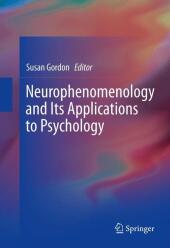 Neuerscheinungen 2015Stand: 2020-02-01 |
Schnellsuche
ISBN/Stichwort/Autor
|
Herderstraße 10
10625 Berlin
Tel.: 030 315 714 16
Fax 030 315 714 14
info@buchspektrum.de |

Susan Gordon
Neurophenomenology and Its Applications to Psychology
Herausgegeben von Gordon, Susan
2013. 2015. xxxvi, 192 S. 2 SW-Abb.,. 235 mm
Verlag/Jahr: SPRINGER, BERLIN; SPRINGER NEW YORK; SPRINGER 2015
ISBN: 1-489-98801-7 (1489988017)
Neue ISBN: 978-1-489-98801-0 (9781489988010)
Preis und Lieferzeit: Bitte klicken
This book explores the meaning and import of neurophenomenology and the philosophy of enactive or embodied cognition for psychology. It introduces the psychologist to an experiential, non-reductive, holistic, theoretical, and practical framework that integrates the approaches of natural and human science to consciousness. In integrating phenomenology with cognitive science, neurophenomenology provides a bridge between the natural and human sciences that opens an interdisciplinary dialogue on the nature of awareness, the ontological primacy of experience, the perception of the observer, and the mind-brain relationship, which will shape the future of psychological theory, research, and practice.__
Enactive Cognition and the Neurophenomenology of Emotion.- Neurophenomenological Praxis: Its Applications to Leaning and Pedagogy.- Cognitive Phenomenology in the Study of Tibetan Meditation: Phenomenological Descriptions vs. Meditation Styles.- Déjà Vu: William James on "The Brain and the Mind,"1878.- Psychoneurointracrinology: The Embodied Self.
"A much welcome, if not over-due, translation of neurophenomenological principles-which have previously remained limited to philosophical discourse-to some of the central concerns of psychologists. Exploring how the mind is embodied in emotion, learning, and self-reflection, this volume is a fitting tribute to the pioneering work of Taylor and Varela."
Larry Davidson, Ph.D.
Professor of Psychiatry
School of Medicine and Institution for Social and Policy Studies
Yale University, New Haven, CT
"This volume accomplishes the elegant and timely synthesis of phenomenology, transpersonal and humanistic-somatic psychologies as they apply to contemporary neuroscience. Both beginners and more advanced scholars will benefit greatly from studying the applications of neurophenomenology to psychology in this book."
Aaron L. Mishara, Ph.D, Psy.D.
Associate Professor
Department of Clinical Psychology
Sofia University, Palo Alto, CA
"A heady mix of articles that elucidates the ´hard problem´ of mind/brain interrelations and travels some distance in closing the circle of psychology on neuroscience. It is true: William James over a century ago was 150 years ahead of his time."
Edward Mendelowitz, Ph.D.
Adjunct Professor
School of Psychology and Interdisciplinary Inquiry
Saybrook University, San Francisco, CA
"Dr. Gordon´s psychoneurointracrine model is eclectic and interdisciplinary. It reveals the mind-brain interface, the growth-oriented dimension of the person, and the myth-making dimension of human experience. My colleagues and I were aware of this process when we wrote about "personal myths" or existential life beliefs, stressing their roots in an individual´s biochemistry. Her model has considerable explanatory value, providing a way to bridge the explanatory gap between the mind and the brain, how the mind develops not only meaning, but one´s sense of well-being, and - ultimately - how the notion of "self" emerges from this complex system."
Stanley Krippner, Ph.D.
Professor of Psychology and Integrative Inquiry
Saybrook University
San Francisco, CA
"Susan Gordon has produced a timely book with her new volume on Neurophenomenology. Neurophenomenology is a hot topic within philosophy and neuroscience, yet its assimilation within mainstream psychology is lagging. This book attempts to bridge the gap between philosophical neurophenomenology and such psychological domains as cognition, emotion, learning, pedagogy, meditation, and psychoneuroimmunology. The book also establishes the kinship of neurophenomenology with humanistic psychology, William James´ radical empiricism, and transpersonal psychology."
Don Moss, Ph.D.
Dean, College of Integrative Medicine and Health Sciences
Chair, School, of Mind-Body Medicine
Saybrook University
Oakland, CA
The Humanistic Psychologist , 43(1)


